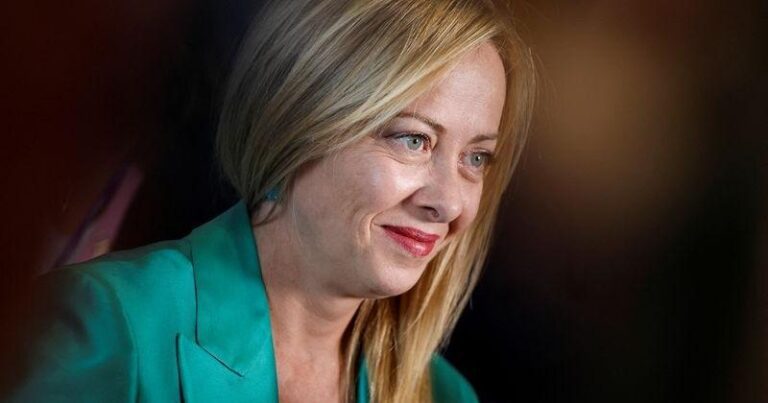By Angelo Amante and Giselda Vagnoni
ROME (Reuters) – Slow economic growth and high interest rates on the country’s huge debt are the main problems facing Italian Prime Minister Giorgia Meloni after her first year in power, an anniversary marked by the announcement brutal departure from his long-time partner.
Meloni’s coalition, the first led by a woman in Italian history, was sworn in a year ago after a sweeping electoral victory and will soon surpass the average post-war term of office of 14 months for Italian governments.
Upon coming to power, it was considered the country’s most right-wing party since wartime dictator Benito Mussolini, while Meloni’s Brothers of Italy party traces its roots to the post-war Italian Social Movement (MSI). -fascist.
Yet Meloni, 46, has worked to allay foreign concerns about possible extremism, forging good relations with his allies by adopting a decidedly pro-Western, pro-EU stance and pledging to fully support Ukraine in its war against Russia.
At home, she has pleased her right-wing base by taking steps to defend the traditional family, protect Italian cultural heritage and try to stem migrant arrivals.
“We have worked tirelessly to repay the trust and demonstrate with facts that it was possible to build a different Italy,” she said in a video message this week.
However, the economic rebound following the COVID-19 pandemic stalled, with gross domestic product contracting 0.4% in the second quarter, and analysts predict Italian growth will be among the weakest in the eurozone next year.
This makes it harder for Meloni to deliver on his tax cut promises and makes Italy’s debt, equal to 140% of national output, vulnerable to market sell-offs.
“The economy is probably the most difficult subject. The government has little room for maneuver,” said Valentina Meliciani, professor of economics at LUISS University in Rome.
Last week, Meloni weathered the first in a series of reviews on Italy’s debt when S&P Global Ratings affirmed the country’s BBB rating with a stable outlook.
However, the prevailing view among analysts is that rating agencies will worsen Rome’s outlook while avoiding an outright downgrade.
Meloni also has personal issues to deal with. She announced Friday that she was splitting from her longtime partner, TV presenter Andrea Giambruno, after he repeatedly sparked outrage over sexist comments made on and off air.
TAX REDUCTIONS
This month, the government approved a 2024 budget that includes about 24 billion euros ($25.3 billion) in tax cuts and increased spending, despite a public debt that is proportionally the second highest of the euro zone after that of Greece.
The budget failed to impress investors and exacerbated a long-standing rise in Italian bond spreads.
The gap between Italian 10-year bond yields and their German equivalents hovers around 2 percentage points (200 basis points), much higher than for any other eurozone country.
Meliciani said Italy’s hopes of reviving its economy and reducing its debt depended heavily on the effective implementation of investment plans financed by the EU’s post-COVID funds.
So far, Rome has struggled to meet Brussels’ political conditions and spend the money it received.
Internationally, in addition to his support for Ukraine, Meloni has largely avoided confrontation with Brussels despite his Eurosceptic past.
She also abandoned calls she made in opposition for a naval blockade to prevent boats from leaving North Africa, despite her failure to stop the influx of migrants.
Arrivals on Italian shores have reached more than 140,000 so far in 2023, almost double compared to the same period last year.
“We expected Italy to be very tough (on immigration) at EU level, but we saw a generally conciliatory attitude, they are working to find a common line,” said Enzo Moavero Milanesi , former Minister of Foreign Affairs.
COMMAND POSITION
At home, Meloni has so far avoided the domestic political chaos that befell so many of her predecessors.
A divided opposition has allowed him to tighten his grip on power and keep his party at the top of the polls, with almost 30% of the voters’ vote, compared to around 18.5% for the center-left Democratic Party (PD). and 17% for the non-conformist. 5 star movement.
His party dominates its coalition allies, the League and Forza Italia, whose cumulative score remains below 20%.
Analysts say a portion of center-right voters have switched from the other two parties to Meloni and are unlikely to shake the balance of power within the coalition by switching back.
“Meloni arrived after a decade of political instability and voters floating in all parties. The country now seems tired of that,” said historian and political expert Giovanni Orsina. ($1 = 0.9476 euros)
(Reporting by Angelo Amante and Giselda Vagnoni, editing by Gavin Jones and Alex Richardson)


